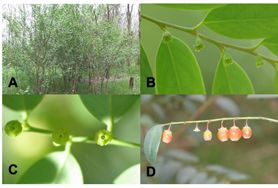Testing for apomixis in an obligate pollination mutualism
DOI:
https://doi.org/10.26786/1920-7603(2021)644Keywords:
Breynia, Epicephala, Phyllanthaceae, apomixis, delayed fruit production, dormant pollinated flowersAbstract
Plants with a small number of specific pollinators may be vulnerable to fluctuations in the availability of those pollinators, which could limit plant reproductive success and even result in extinction. Plants can develop mechanisms to mitigate this risk, such as apomixis. Reproductive assurance mechanisms have been largely ignored in obligate pollination mutualisms (OPMs), that are some of the most specialised of plant-pollinator interactions. Furthermore, although OPMs are often referred to as obligate, this is rarely tested. We performed a flower-bagging experiment to test if the unisexual flowers of Breynia oblongifolia could set fruit in the absence of its highly specialised seed-eating moth pollinators. Surprisingly, many bagged female flowers developed fruits, suggesting apomixis. We therefore conducted a second series of experiments in which we 1) added or excluded pollinators from caged plants; and 2) surveyed a wild population for apomictic reproduction using mother-offspring genotyping. In the absence of pollinators, no fruits developed. In addition, we detected no genetic evidence for apomixis when comparing between mothers and their offspring or between adults in a wild population. We explain the production of fruits in bagged branches by our discovery that B. oblongifolia can retain pollinated female flowers over the winter period. These flowers develop to fruits in the spring in the absence of male flowers or pollinators. Our study thus shows that B. oblongifolia is unable to produce fruit in the absence of its specialist moth pollinators. Thus, the highly specific interaction between plant and pollinators appears to be truly obligate.

Downloads
Published
How to Cite
Issue
Section
License
Copyright (c) 2021 Jonathan TD Finch, Sally A Power, Justin A Welbergen, James M Cook

This work is licensed under a Creative Commons Attribution 4.0 International License.
JPE is an open access journal which means that all content is freely available without charge to the user or his/her institution.
Authors who publish with this journal agree to the following terms:
1) Authors retain copyright and grant the journal right of first publication with the work simultaneously licensed under a Creative Commons Attribution License that allows others to share the work with an acknowledgement of the work's authorship and initial publication in this journal.
2) Authors are able to enter into separate, additional contractual arrangements for the non-exclusive distribution of the journal's published version of the work (e.g., post it to an institutional repository or publish it in a book), with an acknowledgement of its initial publication in this journal.
3) Authors are permitted and encouraged to post their work online (e.g., in institutional repositories or on their website) prior to and during the submission process, as it can lead to productive exchanges, as well as earlier and greater citation of published work (See The Effect of Open Access).
To assure a broader targeted audience, content will be included into databases (such as EBSCO) and directories (such as DOAJ).











